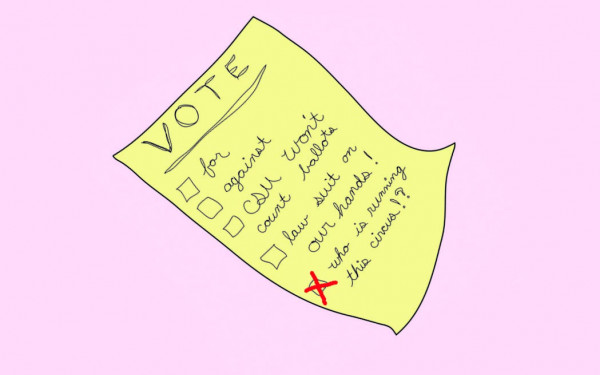CSU’s Electoral Reforms Help the Union
It’s election time again at the Concordia Student Union, and in case you hadn’t heard, all but one of the executive positions are uncontested, as are most of the council and Senate positions.
This has led to questions about whether the electoral reforms made last year have resulted in lower student participation in the CSU elections.
The main policy change I’m referring to is the removal of an affiliation between the executive slate and council and Senate candidates.
The changes were put into effect in 2011 to respond to a highly polarized political culture that had developed, which had come to hinder councillors’ ability to criticize the executives or hold them accountable, particularly because the councillors and executives had run on the same team.
Currently, executive candidates can form a team under a common slate name, such as this year’s CSYou. But when it comes time to vote, they must each be elected independently instead of as a team.
Additionally, though councillors are free to speak for or against an executive slate or candidate, they are not permitted to affiliate themselves with a particular slate and run under their banner.
In contrast, the previous system saw executive slates elected in an all-or-nothing fashion, as students couldn’t vote on executive candidates independently, but only on a whole team. Additionally, council and Senate candidates could affiliate themselves with a slate, though they would still be listed and voted on individually on the ballots.
So, have these changes caused a drop in the number of students that run for elected positions at the undergraduate level?
For executive candidates, there have only been two elections since the changes—including the current one. The first election had two executive slates, and the current election has one slate and two independent candidates.
Given such a small sample size, we simply can’t tell whether a change in executive candidacy has resulted from the electoral changes in question. The coming years will allow for a clearer picture and will give us a better idea of whether the reforms should be left as is or further tweaked.
But with some wondering if we should do away with the reforms entirely and return to the slate system, it’s worth considering other aspects of the numbers.
With regards to non-executive positions, the previous system gave a direct financial incentive to make sure that teams were running as many councillors and senators as possible. A team had $100 more at its disposal to spend on campaign materials for each council and Senate candidate running with it.
This meant that if slates wanted enough money to properly run their campaigns and beat the competing teams, it was wise to run as many candidates as possible, even if that meant recruiting people who didn’t really care about the union beyond being friends with the people on the slates and supporting the fact that they were running.
Further, in the interest of having a supportive council for a given executive’s year in office, slates would tend to recruit people friendly to their team, rather than those that might be critical or act as opposition.
Now that the system has changed and teams aren’t granted extra campaign money for having more candidates, executives don’t have nearly as much incentive to recruit and make sure there’s an abundant amount of councillors and senators lined up.
The current structure—instead of incentivizing the recruitment of friends and the perpetuation of political “camps”—is more conducive to attracting council and Senate candidates that are truly motivated by an interest in the union and in student representation.
In its first two years, these electoral changes do appear to be linked to fewer councillors and senators running for office in comparison to years past. However, they are also more likely to be better motivated to assume their positions.
It should also be pointed out that remnants of the polarized political “camps” still exist, and, in my opinion, the reputation of council as a body rife with petty political infighting remains the main reason that able and motivated students are dissuaded from getting involved.
Gonzo Nieto is a Concordia Student Union Arts & Science councillor and former CSU VP Clubs and Student Space. This article represents his own views, not those of the CSU.

(WEB)_900_600_90.jpg)





_600_375_90_s_c1.jpg)